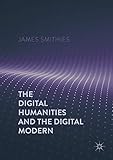The digital humanities and the digital modern /James Smithies.
Material type: TextPublication details: London : Palgrave Macmillan, (c)2017.Description: 1 online resource (ix, 268 pages) : illustrationsContent type:
TextPublication details: London : Palgrave Macmillan, (c)2017.Description: 1 online resource (ix, 268 pages) : illustrationsContent type: - text
- computer
- online resource
- 9781137499448
- AZ105 .D545 2017
- COPYRIGHT NOT covered - Click this link to request copyright permission: https://lib.ciu.edu/copyright-request-form
| Item type | Current library | Collection | Call number | URL | Status | Date due | Barcode | |
|---|---|---|---|---|---|---|---|---|
 Online Book (LOGIN USING YOUR MY CIU LOGIN AND PASSWORD)
Online Book (LOGIN USING YOUR MY CIU LOGIN AND PASSWORD)
|
G. Allen Fleece Library ONLINE | Non-fiction | AZ105 (Browse shelf(Opens below)) | Link to resource | Available | on1002303726 |
Includes bibliographies and index.
Acknowledgements; Contents; List of Figures; 1 The Challenge of the Digital Humanities; References; 2 The Digital Modern; 2.1 The Digital Humanities; 2.2 Reflexive Modernity; 2.3 Ubiquitous Computing; 2.4 Reading the Digital Modern; References; 3 Computation and the Discourse of Crisis; 3.1 The American Critique of Digital Humanities; 3.2 The Humanist Critique of Technology; 3.3 Interpreting Postindustrial Technology; 3.4 Rehabilitating Information Theory and Boolean Logic; References; 4 Artificial Intelligence, Digital Humanities, and the Automation of Labour.
4.1 The Culture of Artificial Intelligence4.2 The Limits of Computation; 4.3 Terra Incognita and the Nature of Consciousness; 4.4 The Automation of Labour; 4.5 Digital Creativity; 4.6 The Technical Context of Full Artificial Intelligence; 4.7 Building Brains; References; 5 Towards a Systems Analysis of the Humanities; 5.1 The Politics of Cyberinfrastructure; 5.2 Non-networked Assets; 5.3 The Internet as Platform; 5.4 Layer 4; 5.5 Complex Systems; References; 6 Software Intensive Humanities; 6.1 Epistemology Engines; 6.2 Tacit Knowledge; 6.3 Postfoundationalism; 6.4 Algorithmic Criticism.
6.5 A Depth Model of Critical Awareness6.6 The Computational Model; 6.7 Visualization; 6.8 Virtual and Augmented Reality; References; 7 The Ethics of Production; 7.1 Digital Culture; 7.2 Craft Ethics; 7.3 A Justification of Method; 7.4 Research-Led Practice; 7.5 Diversity; 7.6 Infrastructure; 7.7 Open Standards, Open Data, Open Source, Open Access; 7.8 Economy and Labour; References; 8 The Culture of the (Digital) Humanities; References; Bibliography; Index.
This book provides new critical and methodological approaches to digital humanities, intended to guide technical development as well as critical analysis. Informed by the history of technology and culture and new perspectives on modernity, Smithies grounds his claims in the engineered nature of computing devices and their complex entanglement with our communities, our scholarly traditions, and our sense of self. The distorting mentalité of the digital modern informs our attitudes to computers and computationally intensive research, leading scholars to reject articulations of meaning that admit the interdependence of humans and the complex socio-technological systems we are embedded inches By framing digital humanities with the digital modern, researchers can rebuild our relationship to technical development, and seek perspectives that unite practical and critical activity. This requires close attention to the cyber-infrastructures that inform our research, the software-intensive methods that are producing new knowledge, and the ethical issues implicit in the production of digital humanities tools and methods. The book will be of interest to anyone interested in the intersection of technology with humanities research, and the future of digital humanities.
COPYRIGHT NOT covered - Click this link to request copyright permission:
There are no comments on this title.
